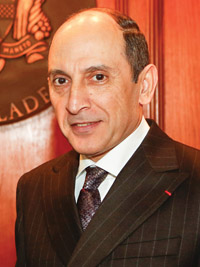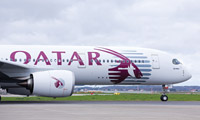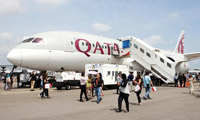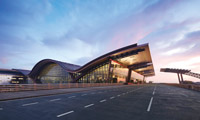Cover Story
MARCHING ACROSS THE GLOBE
He speaks his mind, always, often with acerbic wit. He can drive people mad with his demands for perfection. He expects excellence from his staff and from himself. In the 17 years since Akbar Al Baker and Qatar Airways tied the knot, the airline has become a global player with a stellar reputation for service. Al Baker and Qatar Airways have come a long way baby.
June 1st 2014
Qatar Airways chief executive, Akbar Al Baker, told Orient Aviation he calls 2014 “the year of the fleet”. That is no understatement. Already operating 134 airliners, the Doha-based carrier is in major expansion mode. Read More »
 |
| 'We have progressively developed our operations in the Asia-Pacific. We recently opened routes to Hangzhou and Chengdu and these China routes which offer significant cultural and economic opportunities to our passengers. We are delighted how popular these recently launched routes have become' |
| Akbar Al Baker Qatar Airways chief executive |
More than 300 aircraft, estimated to cost US$60 billion are on their way to their new home at Doha’s $17 billion Hamad International Airport, which opened last month and took in Qatar Airways as its major tenant on May 27.
This month Qatar will begin taking delivery of 13 A380s. Between October and November, the first of 80 A350s – Qatar is the aircraft’s launch customer – will start arriving at Hamad. In the pipeline for delivery are 60 B787 Dreamliners (with 13 already in service), 13 B777s including freighters, 13 A330 freighters, 80 A320neos and 50 B777Xs.
“This airport will redefine the international traveller experience and set a new benchmark for airport excellence, and will enable Qatar Airways to offer our passengers an unrivalled experience,” the Doha-born commerce and economics graduate declared at the opening ceremony.
The aircraft will be needed as the carrier plans its growth to be rapid. Already serving 140 destinations across Europe, the Middle East, Africa, the Asia-Pacific and North and South America, the route planners are in constant search for new destinations.
In May, routes between Doha and Al Hofuf in Saudi Arabia, Turkey’s Istanbul and Edinburgh, Scotland were launched. This month, flights to Miami and Tokyo’s Haneda will be added to the network and in July Dallas/Fort Worth in the U.S. and Djibouti.
Complementing this global expansion, Qatar is planning domestic operations within Saudi Arabia with a new offshoot, Al Maha Airlines, with a launch planned in November.
So, if there is anyone left who believes Qatar Airways is the minor player in the Gulf triumvirate of Emirates Airline, Etihad Airways and Qatar, they need to think again, especially in the company of forthright Al Baker.
“Qatar Airways does not compare itself or compete with its neighbours,” Al Baker told Orient Aviation in May. “We are in the unique position in the Middle East of being within an eight-hour flight of 80% of the world’s population.
“So, naturally, we are not the only airline hub in the region. What we strive for, and do achieve, is unrivalled five-star service for our passengers, complemented even further with the new Hamad International Airport and our modern fleet of young aircraft.”
Qatar Airways is only 17 years old, but its rise has been as spectacular as that of its neighbours. Al Baker is a driven and relentless leader. He took charge of the airline in 1997 after working his way up the ladder at the Civil Aviation Directorate of Qatar.
Those who know him said he is a hard taskmaster, a man who doesn’t suffer fools gladly and expects excellence at every turn. Privately, executives of the big planemakers, Boeing and Airbus, said he is one of the hardest negotiators with which they deal.
He may be mellowing, but he is on record as a stringent critic of suppliers who don’t live up to his standards. He famously said of Boeing when the B787 was suffering delays: “Boeing is run by bean counters and lawyers. We have serious issues with them and if they do not play ball with us they will be in for a serious surprise.”
 |
Airbus also displeased him because he thought the manufacturer was dragging its feet when Qatar wanted to convert some A330s passenger jets into freighters. At the Farnborough Air Show in 2010 he said: “We are talking to Airbus about conversions and if we have no option from them, then we will have to look to Boeing to supply us with some converted freighters, either B777-200s or B767s. I am sure Boeing will oblige. ”
Other observers of the Gulf carriers say those abrasive days are past however Al Baker does constantly demand a better product from his teams and his suppliers. Even before he takes delivery of his first A380 in mid-summer, he has expressed genuine interest in an A380neo upgrade that is a new version of the big plane equipped with the latest engine technology. Emirates has signaled the same interest.
Speaking in Abu Dhabi at the recent Arabian Travel Market, Al Baker, who holds a private pilot’s licence, said: “You know that Qatar Airways will always make sure that whatever is developed by the manufacturers, we will have it.”
“A very good example is the A380. We were so delayed [with the A380] because we demanded that the new wing be attached to our A380s. We will always be a step ahead, together with our friends at Emirates, to ensure both of us always have the best airplanes - similar to what we did with the 777-9X.”
Qatar Airways joined with Emirates at the Dubai Airshow last November and made massive commitments to the Boeing 777-X series. The airliner capitalizes on significantly improved engine technology to deliver major emissions reductions and cost efficiencies. It will enter service late in 2020 or in the following year.
Now employing 30,000 staff, 17,000 directly and another 13,000 in its subsidiaries, Qatar Airways was a different animal when it was established in November 1993. It began operations in January 1994 with a single wet-leased B767-200ER from Kuwait Airways. Privately owned by members of the royal family of Qatar, it was re-launched in 1997, with a new management team. Al Baker, who had held several senior positions at Qatar’s Civil Aviation Directorate, got the top job.
He told Orient Aviation in 2010 that some of his international competitors “can’t move at the speed we do because they don’t have the courage, they do not have the will and they do not have the stomach to stand up to the competition”.
 |
| A Qatar Airways B787 was on display at the Singapore Air Show in February |
Al Baker has surprised many industry observers with new strategies. He bucked what was believed to be a Gulf trend: that the big carriers in the region would eschew global alliance membership. Qatar joined oneworld last October.
“Alliances are playing an increasingly important role in the airline industry today – and that will continue long into the future,” he said. “Becoming a member of oneworld is one of the most significant landmarks in Qatar Airways’ history.
“It will strengthen our competitive offering and give our customers what they fully deserve – more choice across a truly global network served with airline partners who include some of the best and biggest in the world.
“In Qatar Airways’ relatively short history, we have established a reputation for innovation, quality and excellence in everything we do. We are pleased to build on that as the only major airline from the Gulf to join any of the global airline alliances – and we are proud to become part of what is clearly the world’s top quality airline alliance, oneworld.”
Al Baker is convinced the future of aviation will be strategic alliances. “Today, the five major alliances are Star, Oneworld, Qualiflyer, SkyTeam and Wings, which account for a large percentage of all air travel. Alliances are an excellent platform for airlines from different parts of the world to identify mutually beneficial areas of collaboration,” he said.
“It enables the airlines to build and expand its network of routes, provides increased benefits to passengers, penetrates new markets, creates operational efficiency and expands customer bases with ease.”
In another move regarded as surprising, considering the luxury carrier branding it promotes, is the removal of the first class cabin from most of its fleet – with the exception of Qatar’s A380s. It began scaling back its first class offering in 2008 after the global financial crisis hit. The airline’s entire fleet of B777s have only economy and business cabins.
The B787s and the new A350s coming into the fleet will have a two-class layout. None of this means corporate travelers will suffer. Qatar is working on a new berth it calls “super business class” that will be introduced within 24 months, said Al Baker.
| 'All air traffic in the Gulf region is increasingly being channeled into a small number of corridors. This is not an issue restricted to the Gulf. I would like to see a single air traffic management system that would allow neighboring countries to co-operate to improve efficiency and mitigate the pressure we are feeling from fuel prices and environmental concerns' |
| Akbar Al Baker |
“Qatar Airways will soon launch its first all-business class daily service to London, which has garnered immense popularity and drawn a lot of attention [to is] globally,” he said. “The Doha- London Heathrow route is one of Qatar Airways’ most popular international routes. It was only fitting that we introduce an all Business Class service on this key route, where customers will also benefit from our new Qatar Airways premium lounge in London Heathrow’s terminal four, and, of course, the Premium Terminal in Doha.
“This move is testimony in itself about the strong demand we see for a superior business product over First Class. In a global economy where passengers and businesses are looking to move around the world in comfort, yet at the best value for money, it would be hard to beat our offering.”
Another significant change has taken place in the last year. Qatar’s sovereign wealth fund has bought into the national airline, which was formerly owned by an ex-Qatari prime minister and several smaller shareholders. Qatar Airways is now a fully government-owned entity.
Until the policy change, it had been jointly held in a public-private partnership, with about 50% of its equity controlled by ex-prime minister, Sheikh Hamad bin Jassim al-Thani (a member of the ruling family), along with other investors. The sell-off was understood to be part of a government strategy to reduce ruling family members direct ownership of local companies.
The share buy-out took place last July, but it was only recently confirmed. The price the fund paid for its equity has not been disclosed. One thing it does mean is that Qatar Airways, which as a private company did not previously release detailed financial reports, will now do so. It plans to announce its 2013 financial results before the third quarter of this year.
“Qatar Airways is a profitable company,” Al Baker told Orient Aviation. “Our aircraft signify some of the most expensive real estate in the world. We fill that space to an absolute optimum, while providing our customers with our five-star signature service to ensure they return.
“As a fully owned state airline, we have the benefit of working with the Government in the State of Qatar to ensure our own aggressive growth plans are in line with that of the country and economy as a whole.” It is understood the carrier achieved a revenue target of over $10 billion in 2013.
 |
While Qatar already has a global network, Al Baker has a keen interest in increasing penetration of key Asia-Pacific markets, particularly India and China. “We have progressively developed our operations in the Asia-Pacific region over the years. In China, we now connect even more passengers through our seven gateways to the Middle East and onwards on our network of 140 destinations around the world,” said Al Baker. “We recently opened new routes to Hangzhou and Chengdu in China. These routes offer significant cultural and economic opportunities to passengers on our five-star network and we are delighted with how popular these recently launched routes have become.”
Qatar Airways’ codeshare agreements in Asia include All Nippon Airways, Japan Airlines, Asiana Airlines, Bangkok Airways, Cathay Pacific Airways, Garuda Indonesia and Malaysia Airlines.
Al Baker said: “In the last decade, Indian aviation has witnessed phenomenal growth. “Today, the industry is growing further still in terms of airline operations, additional capacity and new airports, which will all ultimately create economic benefits.
“Owing to the strong cultural, social and trade links between Qatar and India, and with the presence of large Indian expatriate community around the world, Qatar Airways has become a favorable choice amongst travelers.
“Our strategy is to expand our footprint in the country as well as increase frequency on existing routes to offer passengers greater choice,” he said.
In the midst of all this growth, Al Baker said the opening of Hamad International Airport is a key to the future. “The world’s latest global gateway will raise the bar on passenger expectations, thanks to its state-of-the-art facilities and passenger-focused design.
Designed to accommodate 30 million passengers annually, rising to 50 million upon full completion, the airport covers an area of 29 sq kms and is 60% built on land reclaimed from the Gulf.
It features 138 check-in counters across 5 islands; 14 seated check-in areas for Qatar Airways’ First Class passengers and 16 counters dedicated to Qatar Airways’ Business Class passengers. In addition, HIA will operate 41 contact gates, which will increase to 65 once the airport opens Concourses D and E. Six gates will be fully dedicated to servicing the A380 aircraft.
Not surprisingly, Qatar Airways has continued to rack up awards for its service and facilities. At the 2013 annual Skytrax World Airline Awards, held during the Paris Air Show at Le Bourget, it was awarded World’s Best Business Class, World’s Best Business Class Lounge and, for the second consecutive year, Best Airline Staff Service in the Middle East.
Despite its spectacular growth, the Gulf region also faces problems common to many areas. Rapid expansion of traffic has led to airways congestion. “All air traffic in the Gulf region is increasingly being channeled into a small number of corridors,” said Al Baker. “This is not an issue restricted to the Gulf, however, and all over the world we are seeing increasingly crowded skies. Ideally, I would like to see a single air traffic management system. This would allow neighbouring countries to cooperate to improve efficiency and mitigate the pressure we are feeling from fuel prices and environmental concerns.”
He said that as guests and aviation leaders arrive at Doha for the IATA AGM this month the airline looked forward “to them witnessing the new infrastructural developments in our country, especially the new Hamad International Airport, the world’s newest airport gateway. “Such improvements and investments make us the ideal country, both geographically and logistically to host such events”, he said.
Qatar Airways is a strong supporter of IATA, he added, and as such is looking forward with keen anticipation to hosting this event. “This year’s AGM is the first to take place in the Middle East since Amman, Jordan, in 1997, and this is only the fourth time that the AGM has been held in the region. This year’s event will be particularly significant as the aviation industry is celebrating 100 years since the first scheduled commercial flight, and I am sure that a host of key aviation topics will be discussed,” he said.
As for the future, Al Baker is typically clear: “We are committed to offering our customers the best possible experience when it comes to travelling with Qatar Airways, not only in terms of custom-built comfort features across all of our cabins, but with the continued expansion of our young and modern fleet. In just 17 years of operations we have witnessed incredible growth and with our new hub at Hamad International Airport, we expect this growth to continue.
“We will do this by continuing to listening to our customers, keeping an eye on trends and exploring the possibilities of underserved markets, while paying attention to our customers’ every need.”